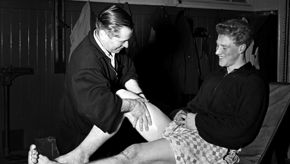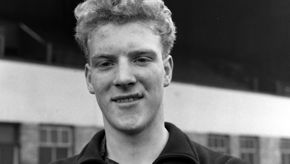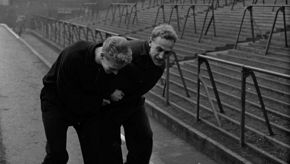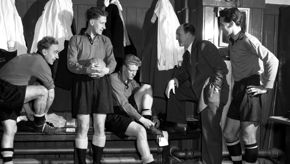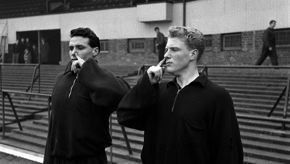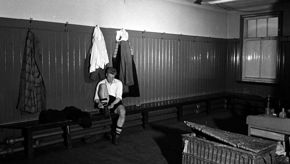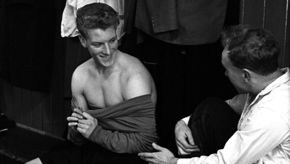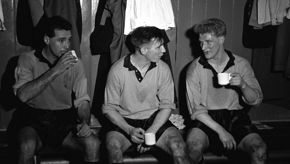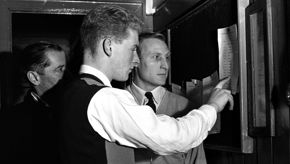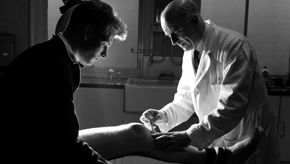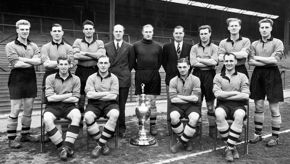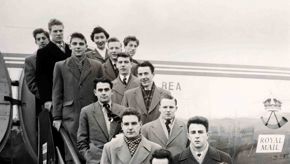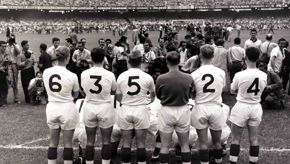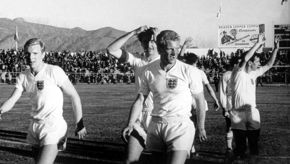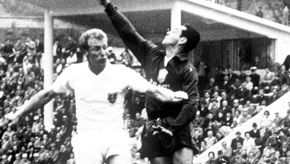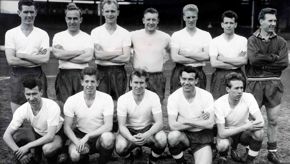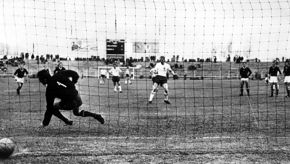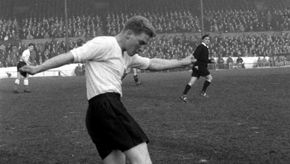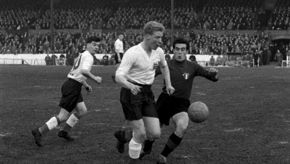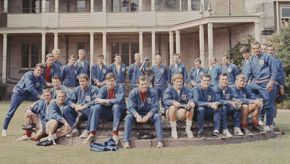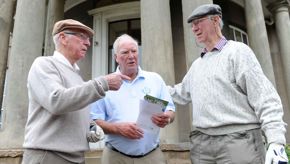The blond-haired Yorkshireman trod the world football stage and faced some of the greatest players the game has seen – Puskas, Pele, di Stefano and Eusebio, to name but a few.
Owner of a World Cup winner’s medal as a member of Alf Ramsey’s squad of 1966, Flowers, who has died aged 87, captained his country three times and was once the side’s penalty ace, boasting a 100 per cent record.
Flowers grew up in Edlington, Yorkshire, and was briefly on Doncaster Rovers’ books while also working in the British Railways loco sheds in Doncaster. He decided he was making no progress with Rovers and joined Wolves’ Yorkshire nursery club, Wath Wanderers, under the guidance of former player Mark Crook.
It was not long before Flowers was sent to try his luck at Molineux and he was given his first team debut at 18, playing at centre-half against Blackpool in September, 1952. He was moved to left-half early in that match and marked his debut with a headed goal from a corner in a 5-2 home defeat.
It was not an auspicious beginning but two games later he looked far more assured as Wolves beat league champions Manchester United 6-2 on the day another half-back made his debut, a talented amateur international named Bill Slater. Both men would carve their names into the club’s history.
Flowers established a place in the first team towards the end of the 1953/54 season as Wolves became champions of England for the first time. He made 15 appearances, enough to gain him a championship winner’s medal.
His impressive performances the following season saw him capped for England against France playing alongside the great Duncan Edwards and club colleagues Bert Williams, Billy Wright and Dennis Wilshaw, the first time Wolves had supplied four men to an England side.
We are deeply saddened to announce the passing of club legend and vice president Ron Flowers MBE at the age of 87.
— Wolves (@Wolves) November 12, 2021
A giant on the pitch and a gentleman off it. There will be many people remembering Ron today and all of our thoughts are with those who knew and loved him. pic.twitter.com/iq1ZqxNhL7
By his own admission Flowers had a poor game and was promptly dropped, though he did play a couple of times for the under-23 side. When he regained his England place in 1958 he soon established himself as a fixture for his country. Such was the club’s half-back strength at the time that the man he replaced in the national side was Slater who with Eddie Clamp had played for England in that year’s World Cup finals.
Slater had played in the tournament in Sweden after the Munich air crash had claimed the life of Duncan Edwards along with seven other Manchester United players. That awesome task could so easily have fallen to Flowers. He was Wolves’ first choice until Boxing Day 1957 and playing well when a bout of flu laid him low. So Slater stepped up from the reserves and did so well that Flowers could not regain his place. When England sadly had to find a replacement for Edwards it was to champions Wolves they turned and to Slater, the club’s first choice left-half at the time.
Eventually, Flowers regained his place. Slater was playing right-half and Flowers left-half at the time and such was his form that Flowers was recalled by the selectors even though Slater had done well at left-half in the previous international – a 5-0 win over the USSR. So Flowers faced Wales at Villa Park in November, 1958, the start of a run of 40 consecutive England games, a sequence bettered only by Billy Wright with 70.
Initially an attacking wing-half, or midfielder in today’s terminology, Flowers later became a central defender with England, playing first alongside Sheffield Wednesday’s Peter Swan and then Tottenham’s Maurice Norman.
The role of penalty-taker was given to Flowers after Bobby Charlton vowed never to take another following missing a twice-taken kick against Scotland at Hampden Park in 1960. Although not his club’s regular taker, Flowers was asked by Walter Winterbottom during a practice session to try a few kicks against keeper Ron Springett. Flowers did well enough to be given the job.
An 8-0 defeat of Mexico in the summer of 1961 saw Flowers score the first of six successful penalties. With two goals from the penalty spot, Flowers took great pleasure in being his country’s top goalscorer – ahead of Charlton and Jimmy Greaves – in the 1962 World Cup finals in Chile.
Although he was no longer first choice by 1966, Flowers was still a key member of Ramsey’s squad and very nearly played in the World Cup final against West Germany. Jackie Charlton, suffering with a heavy cold, was doubtful on the eve of the Wembley showdown and Ramsey told Flowers he would deputise if necessary. However, Charlton recovered in time to retain his place. Not that Flowers had built up his hopes – he knew that it would take something more serious than a bad cold to prevent Charlton playing in the most famous game in the history of English football.
